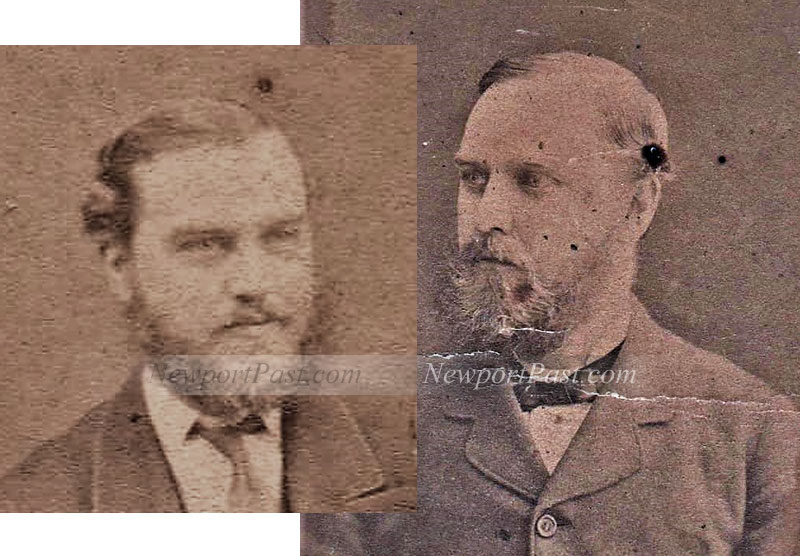Joseph Gibbs, Mayor of Newport 1878-79
 Photo reference number: 1892
Photo reference number: 1892
Two photos of Joseph Gibbs, kindly sent to us by his great grandson, Peter Gibbs.
Joseph Gibbs was Mayor of Newport 1878-9.
Peter also sent us the following information about his great grandfather:
My great grandfather, Joseph, was born in a small cottage alongside the parish pump in the tiny village of Souldern, North Oxfordshire, son of clockmaker, Joseph Gibbs, and his wife, Jane, daughter of the local Boddington farming family.
The couple were to have four sons and four daughters, but four died in infanthood and only two - Joseph and his sister, Ann, were to survive beyond their early twenties.
Joseph, born in 1843, was obviously a bright child and a great uncle, Joseph Plumb of Tredington Warwickshire, left money for his education. He went on to study law. By the 1861 census he was living as a boarder at a house in Evesham, Worcestershire, where he was described as a solicitor's conveyancing clerk.
Later as a young solicitor his work took him to Mildenhall in Suffolk and there he met his future wife, Kitty Youngman. They married in St John's Wood Church, London in 1870.
Joseph and his new bride moved to Newport where his legal practice flourished and his wealth increased, leading him to go into property development, building houses to rent and naming the streets after his children - a Gibbs Road still survives.
He also entered local politics as a Conservative representing the East Ward and in November, 1878 - the year he became the town's chief magistrate - he was proposed as the next mayor, a suggestion that was opposed by some in view of his youth and the fact that he had only been on the council for two years, according to a detailed report in the Monmouthshire Merlin and South Wales Advertiser.
One councillor referred to suggestions of a secret meeting and attacked private wire-pulling to rig the election, saying he believed that 'private friendships and business connections had had a great deal to do with the nomination.'
However Joseph was elected on a show of hands and, after donning the mayoral robes, acknowledged that while 'his knowledge of municipal matters must necessarily be of a limited kind', he was prepared to 'devote his best energies, such as they were, to the discharge of the duties of the high position to which he had been raised.'
He went on to say he hoped the year ahead would be one of trade revival and that he thought that a railway connecting Newport with the 'vast coal fields of the Rhondda valley' would be started very shortly.
Joseph said he believed that when the railway was completed the shipping and commerce of Newport would be increased greatly and their dock accommodation, large as it was, would become inadequate, so making the case for an extension of the town's Alexandra Dock.
Mayor Joseph established a Newport Relief Fund and soup kitchens were provided for the needy. There were complaints that every hundred yards or so the public were accosted by men, women and children begging for alms. Coal stealing was on the increase and many children were involved. Magistrates, looking at the youth of the culprits before them, invariably treated them 'leniently' and merely ordered them to undergo a short imprisonment in the cells and a whipping.
By this time Joseph's home was the imposing Bryn Tegid Villa, in the wealthy Gold Tops district overlooking the town, and it must have become very noisy with the arrival of eight children - Joseph Archibald Youngman (Archie, b. 1871), Ernest Reginald (Reginald, b. 1873), Ethel Annie (Dollie, b. 1874), Percival Raymond (Raymond, b. 1877), Charles Lionel (Lionel, b. 1877), Mildred Mary (Mim, b. 1879), Horace Boddington (b. 1881) and Florence Beatrice(Flo, b. 1885).
By 1889 Joseph was working from Arlington Chambers, Newport, with another solicitor, John Moxon, as a junior partner, but his glittering career came to an abrupt end on February 27 of that year after he had caught a chill on a business trip to London.
A local newspaper reported: 'The deceased had been unwell for about a week and remained indoors in the hope of shaking off the malady. He died in his sleep, or whilst he was dozing, during the absence of Mrs. Gibbs and her children, who were taking part in the rehearsal at the New Theatre in a performance on behalf of the Children's Home. Immediately on her return she went to see her husband and was shocked to find him dead.'
One obituary noted: 'In politics Mr Gibbs was a staunch Tory, although a recent notable confession of his, made in a speech in the town council during a debate on the harbour commission question, showed that his mind had been influenced by misinterpretation in certain quarters of his action in regard to that matter.'
Joseph's funeral was a lavish civic occasion according to one local newspaper with the cortege procession from Gold Tops to the New Cemetery (now St Woolos Cemetery), being watched by large crowds as it passed through the streets of Newport.
The large official party included the mayor and aldermen with the borough maces draped in black crepe carried by two policemen with 'a posse of constables under the command of Superintendent Sinclair'.
Joseph was laid to rest in a 'coffin of polished oak with massive brass mountings' in an impressive tomb and it was here that he was joined by Kitty, when she died in 1924.
His will showed that he left in addition to property £29,439 16s 11d - a considerable sum in those days.